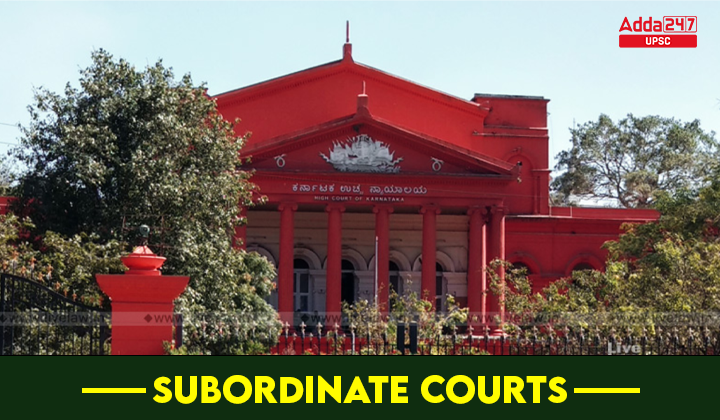Table of Contents
Subordinate Courts: India’s legal landscape is characterized by a complex hierarchical structure of courts that ensures the delivery of justice to every citizen. At the base of this structure lies the vital component known as subordinate courts. Subordinate courts play a pivotal role in the administration of justice, ensuring access to justice, and maintaining the rule of law across the country. Let us delves into the significance, structure, functions, challenges, and reforms associated with India’s subordinate courts, shedding light on their vital role in upholding the principles of justice.
Subordinate Courts
- Subordinate courts, also known as district courts, form the cornerstone of India’s judiciary.
- These courts are distributed across the nation’s districts, ensuring that justice is accessible even in the remotest corners.
- With a wide range of civil, criminal, and family matters falling under their jurisdiction, subordinate courts provide the first point of contact for individuals seeking legal redressal.
- This decentralized approach is integral to addressing the diverse needs and concerns of India’s vast and varied population.
Types of Subordinate Courts
There are there types of Subordinate Courts in India. Check Subordinate Courts types are as follows in the given table.
| Subordinate Civil Courts | Subordinate Criminal Courts | Subordinate Revenue Courts |
|---|---|---|
| Handle civil cases related to disputes over property, divorce, landlord-tenant conflicts, consumer issues, etc. | Deal with criminal cases involving violations of the law such as theft, murder, assault, etc. | Specialize in cases related to land revenue within the state |
| Settle disputes and provide resolutions but do not impose criminal punishments. | Impart punishments to offenders, including fines, imprisonment, or even the death penalty. | The highest revenue court is the Board of Revenue, which hears final appeals. |
| Judges cannot convict and send individuals to prison; they can only impose fines. | Sentences imposed can range from fines to life imprisonment or the death penalty. | Below the Board of Revenue, there are Courts of Commissioners, Collectors, Tehsildars, and Naib/Assistant Tehsildars. |
| Operate in accordance with the Civil Procedure Code of the state. | Operate according to the Indian Penal Code and the Criminal Procedure Code. | Focus exclusively on cases related to land revenue matters. |
| Deal with cases like property disputes, divorce, and breach of contract. | Handle cases including theft, rape, and physical assault. | These courts are crucial for matters concerning land revenue collection and disputes. |
| Provide resolutions for civil disputes without criminal punishment. | Impart criminal punishments as authorized by the Indian Penal Code. | Play a vital role in maintaining land revenue records and resolving related conflicts. |
Subordinate Courts Structure and Jurisdiction
Subordinate courts are organized hierarchically, with district courts at the district level and additional district and session courts and courts of magistrates operating below them.
- Each state in India is divided into districts, and every district typically has a district court.
- Below the district court, there are sub-courts, which deal with specific types of cases such as civil, criminal, family, and juvenile matters.
- The jurisdiction of subordinate courts includes both original and appellate jurisdiction.
- District courts exercise original jurisdiction in civil and criminal cases of considerable magnitude.
- They also have appellate jurisdiction over decisions made by subordinate courts below them.
- Additionally, the sessions courts adjudicate criminal cases involving serious offenses and are usually presided over by a Sessions Judge.
Subordinate Courts Functions and Responsibilities
Subordinate courts are entrusted with various functions, including but not limited to:
- Dispute Resolution: Subordinate courts play a crucial role in resolving disputes of civil, criminal, and family nature. They facilitate settlements, conduct trials, and deliver verdicts based on the facts and evidence presented before them.
- Criminal Justice: These courts handle criminal cases, ranging from minor offenses to serious crimes. Their function in the criminal justice system is vital to ensuring a fair trial and appropriate punishment for offenders.
- Civil Litigation: Subordinate courts are involved in civil litigation, including matters related to property disputes, contractual disagreements, and personal injuries. Their role in resolving civil disputes contributes to maintaining social harmony.
- Family Matters: Family courts, a type of subordinate court, deal with issues such as divorce, child custody, maintenance, and adoption. They strive to provide a sensitive and empathetic approach to resolving familial conflicts.
- Juvenile Justice: Subordinate courts also handle cases involving juvenile offenders. Special attention is given to rehabilitating and reforming juveniles involved in criminal activities.
Challenges Faced by Subordinate Courts
While subordinate courts are an integral part of India’s judicial system, they face numerous challenges that hinder their efficient functioning:
- Case Backlog: One of the most significant challenges is the accumulation of pending cases. The sheer volume of cases can lead to delays in justice delivery, undermining the principle of a speedy trial.
- Infrastructure and Resources: Many subordinate courts struggle with inadequate infrastructure, including courtrooms, staff, and modern technologies. This can impact the efficiency and effectiveness of court proceedings.
- Overburdened Judges: Judges in subordinate courts often handle a high number of cases simultaneously. This workload can compromise the quality of judgments and result in judicial burnout.
- Legal Awareness: Lack of legal awareness among citizens, especially in rural areas, contributes to frivolous litigation and unnecessary burden on the courts.
- Procedural Complexities: Legal procedures can be complex and time-consuming, deterring individuals from seeking legal recourse and adding to the backlog.
Subordinate Courts Reforms and Way Forward
Recognizing the challenges faced by subordinate courts, several measures have been proposed to address these issues and improve their functioning:
- Technology Integration: Leveraging technology can streamline court processes, reduce paperwork, and enable remote hearings, thereby increasing efficiency and accessibility.
Eg- Recently, SC has got a digital makeover. - Strengthening Infrastructure: Adequate allocation of funds for building and maintaining court infrastructure is crucial.
- This includes constructing new court complexes and upgrading existing ones.
- Judicial Capacity Building: Continuous training and capacity-building programs for judges and court staff can enhance their skills, leading to more effective and efficient case management.
- Alternative Dispute Resolution (ADR): Promoting ADR mechanisms like mediation and arbitration can help in resolving disputes outside the court system, thereby reducing the burden on subordinate courts.
- Legal Literacy: Initiatives to enhance legal awareness among citizens can empower them to make informed decisions and reduce unnecessary litigation.
- Fast-Track Courts: Establishing specialized fast-track courts to deal with specific types of cases, such as cases related to women, children, and elderly citizens, can expedite justice delivery.
Conclusion On Subordinate Courts
Subordinate courts are the backbone of India’s judicial system, serving as the first point of contact for individuals seeking justice. Their accessibility, jurisdiction, and functions make them an essential component of the legal framework. However, the challenges they face, including case backlogs and infrastructure deficiencies, cannot be ignored.
The path to a more effective judicial system lies in embracing technology, strengthening infrastructure, and promoting legal awareness. By addressing these challenges and implementing necessary reforms, India can ensure that its subordinate courts continue to uphold the principles of justice, protect citizens’ rights, and maintain the rule of law.
| Relatable Articles | |
| Emergency in India | Centre State Relations |
| Special Provisions Act | Cooperative Societies |




 TSPSC Group 1 Question Paper 2024, Downl...
TSPSC Group 1 Question Paper 2024, Downl...
 TSPSC Group 1 Answer key 2024 Out, Downl...
TSPSC Group 1 Answer key 2024 Out, Downl...
 UPSC Prelims 2024 Question Paper, Downlo...
UPSC Prelims 2024 Question Paper, Downlo...





